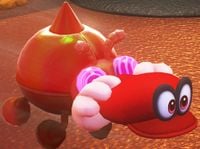Trapeetle: Difference between revisions
(enemy behavior revision) |
|||
| Line 7: | Line 7: | ||
{{quote|It CAUGHT me!? I can't get away!|Cappy|Super Mario Odyssey}} | {{quote|It CAUGHT me!? I can't get away!|Cappy|Super Mario Odyssey}} | ||
[[File:SMO Trapeetle Self Destruct.jpg|thumb|left|200px|A Trapeetle preparing to explode]] | [[File:SMO Trapeetle Self Destruct.jpg|thumb|left|200px|A Trapeetle preparing to explode]] | ||
'''Trapeetles''' are spherical beetle enemies with two large hands, purple chameleon-like eyes and a spike on top. They appear exclusively in the [[Lost Kingdom]] of ''[[Super Mario Odyssey]]''. Their name is a portmanteau of "trap" and "beetle" | '''Trapeetles''' are spherical beetle enemies with two large hands, purple chameleon-like eyes and a spike on top. They appear exclusively in the [[Lost Kingdom]] of ''[[Super Mario Odyssey]]''. Their name is a portmanteau of "trap" and "beetle". | ||
The brochure for the kingdom warns heavily against them, referring to their explosive behavior as "a tragic display seen absolutely nowhere else in nature."<ref>[https://i.imgur.com/kWVFLbT.jpg Kingdom Brochures]</ref> | When Trapeetles see Mario, they slowly walk toward Mario, but do not walk off ledges. Trapeetles stop if they hit, but resume afterward. If Mario gets too far away, a Trapeetle will stop its pursuit. Left alone long enough, a Trapeetle vanishes. Using the [[Cap Throw]] against a Trapbeetle causes it to catch [[Cappy]]. On the first instance, Cappy is surprised at being caught. In this state, the enemy glows red and charges up while continuing to face Mario. Once complete, the Trapeetle launches in Mario's direction to explode on impact or after flying too far. They only aim on the horizontal plane they are on. They move in a straight line, ignoring gravity. Their trajectory is locked upon launching, allowing Mario to dodge around them. Once they explode, Cappy is freed. After either vanishing or exploding, they burrow out of the ground at their spawn point. Mario and Cappy can use a Trapeetle's attack to their advantage by luring it into tackling destructible [[Block (Super Mario Odyssey)|Blocks]], which can clear paths or reveal hidden items. | ||
The brochure for the kingdom warns heavily against them, referring to their explosive behavior as "a tragic display seen absolutely nowhere else in nature."<ref>[https://i.imgur.com/kWVFLbT.jpg Kingdom Brochures]</ref> It does not say anything about Trapbeetles launching before exploding, which may mean the launching behavior is caused by Cappy's attempts to escape from Trapbeetles rather than an inherent ability. | |||
A concept design for the Trapeetles depicted them as [[Bob-omb]] variants with suction cups for feet.<ref>[[The Art of Super Mario Odyssey]], page 166</ref> | A concept design for the Trapeetles depicted them as [[Bob-omb]] variants with suction cups for feet.<ref>[[The Art of Super Mario Odyssey]], page 166</ref> | ||
Latest revision as of 13:57, August 21, 2024
| Trapeetle | |
|---|---|
Artwork of a Trapeetle from Super Mario Odyssey. | |
| First appearance | Super Mario Odyssey (2017) |
- “It CAUGHT me!? I can't get away!”
- —Cappy, Super Mario Odyssey
Trapeetles are spherical beetle enemies with two large hands, purple chameleon-like eyes and a spike on top. They appear exclusively in the Lost Kingdom of Super Mario Odyssey. Their name is a portmanteau of "trap" and "beetle".
When Trapeetles see Mario, they slowly walk toward Mario, but do not walk off ledges. Trapeetles stop if they hit, but resume afterward. If Mario gets too far away, a Trapeetle will stop its pursuit. Left alone long enough, a Trapeetle vanishes. Using the Cap Throw against a Trapbeetle causes it to catch Cappy. On the first instance, Cappy is surprised at being caught. In this state, the enemy glows red and charges up while continuing to face Mario. Once complete, the Trapeetle launches in Mario's direction to explode on impact or after flying too far. They only aim on the horizontal plane they are on. They move in a straight line, ignoring gravity. Their trajectory is locked upon launching, allowing Mario to dodge around them. Once they explode, Cappy is freed. After either vanishing or exploding, they burrow out of the ground at their spawn point. Mario and Cappy can use a Trapeetle's attack to their advantage by luring it into tackling destructible Blocks, which can clear paths or reveal hidden items.
The brochure for the kingdom warns heavily against them, referring to their explosive behavior as "a tragic display seen absolutely nowhere else in nature."[1] It does not say anything about Trapbeetles launching before exploding, which may mean the launching behavior is caused by Cappy's attempts to escape from Trapbeetles rather than an inherent ability.
A concept design for the Trapeetles depicted them as Bob-omb variants with suction cups for feet.[2]
Names in other languages[edit]
| Language | Name | Meaning | Notes |
|---|---|---|---|
| Japanese | キャッチムシ[?] Kyatchi Mushi |
Catch Insect | |
| French | Raflard[?] | From rafler (to grab by force) and the pejorative suffix -ard | |
| German | Schnappäfer[?] | Contracted form of Schnapp Käfer ("snap beetle") | |
| Italian | Rapinsetto[?] | Portmanteau of rapire ("to kidnap") and insetto ("bug", "insect") | |
| Korean | 캐치벌레[?] Kaechi Beolle |
Catch Bug | |
| Russian | Жук-хватун[?] Zhuk-khvatun |
Catching Beetle | |
| Spanish | Atraparásito[?] | Portmanteau of atrapar ("to catch") and parásito ("parasite") |
References[edit]
- ^ Kingdom Brochures
- ^ The Art of Super Mario Odyssey, page 166
